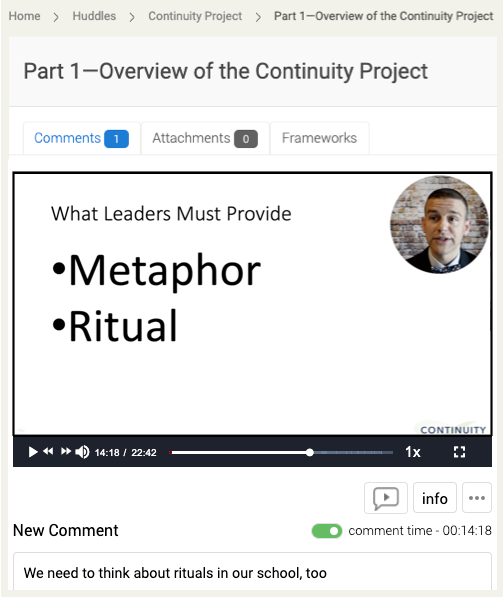
As leaders, how can we create a sense of continuity for staff and students in the coming school year?
We don't know when or how schools will reopen, and even after getting "back to normal," we may have periods of closure and disruption throughout the school year. Leaders are being asked to plan for multiple scenarios, including operate virtually or in a hybrid format for part of the year.
We're accustomed to working in full, uninterrupted school years, and doing the bulk of our work in person. Both may be impossible for the 2020-2021 school year, yet the work of educating students must move forward.
All of these questions will require our best collective thinking and teamwork in the coming months—both within organizations, and globally as a profession.
Adaptive, Not Just Technical, Challenges
State and local officials will no doubt provide ample—if not always feasible—guidance on how to best proceed as we reopen schools:
- We'll mark the hallways and separate the desks for social distancing
- We'll develop new procedures for sanitizing classrooms and put up plexiglass in the office.
- We'll develop transportation plans, design staggered schedules, and figure out what to do about lunch
These are the technical challenges we'll face. They're the details that we'll iron out, as we always do.
But every technical change has unintended consequences that wise leaders know to anticipate and prepare for, even if they can't be fully predicted or prevented.
Doing dramatically different things requires us to become different people—individually and collectively.
Harvard's Ron Heifetz describes problems that require us to change as adaptive challenges:

Technical problems, while often challenging, can be solved applying existing know-how and the organization’s current problem-solving processes. Adaptive problems resist these kinds of solutions because they require individuals throughout the organization to alter their ways; as the people themselves are the problem, the solution lies with them. Responding to an adaptive challenge with a technical fix may have some short-term appeal. But to make real progress, sooner or later those who lead must ask themselves and the people in the organization to face a set of deeper issues—and to accept a solution that may require turning part or all of the organization upside down.
The Continuity Project is a collaboration between Sibme, The Principal Center, and school leaders around the world, aimed at tackling the practical, cultural, and relational challenges we'll face in the coming year—both technical and adaptive.

Practical Challenges
![shutterstock_331435784 [Converted]-01](https://www.principalcenter.com/wp-content/uploads/shutterstock_331435784-Converted-01.png)
Cultural Challenges

Relational Challenges
Instructional Leadership for Virtual Work & Learning: The Asynchronous Opportunity
While many other professions and industries have adapted—from curbside prescription pickup to telemedicine—educators face unique challenges.
Our work is intensely interpersonal, involving large numbers of people who must work together in new ways.
Setting up a Zoom meeting and doing exactly what we'd do in person doesn't really work—not for students, and not for teams of teachers who are accustomed to collaborating face-to-face.
As leaders, we must provide both practical guidance and new norms for learning and working together.
One big shift: the rise of asynchronous interaction.
We've had email and Google Docs for more than a decade, but collaboration has happened overwhelmingly in person and in real time. Whether we're ready or not, it's time to take advantage of the asynchronous opportunity.
It's often true that "This meeting could have been an email," but we also need ways to have real discussions without meeting in real time, and without reply-all email threads that spiral out of control.
And when we do meet synchronously—whether in Google Meet, Microsoft Teams, or some other way—we need new norms for interaction to ensure that the meeting's purpose is accomplished, and our culture is strengthened.
We'll need to make these shifts quickly, but we don't need to make them alone. The Continuity Project is designed to help instructional leaders navigate the many changes involved in remote and asynchronous work, to create a sense of continuity for staff and students.

Project Format
Just as schools are developing new ways of working together, the Continuity Project features both live and asynchronous components to support school leaders in addressing both technical and adaptive challenges.
Live Training on The Instructional Leadership Show
Each week on the Instructional Leadership Show, we'll have new professional development sessions to energize and inform your thinking.
Each episode is uploaded to our project huddle in Sibme, so you can watch, comment, and discuss your insights with other participants.
We're taking advantage of Sibme's advanced video annotation features, so you can leave timestamped comments to discuss specific parts of a session.
We recommend that you use a similar approach to involve staff in video announcements, virtual training sessions, and meetings.
You can also schedule secure Zoom meetings, go live directly within the Sibme app, or record video and upload it to your Huddle for discussion and annotation.
Once a video artifact has been uploaded, people can watch and comment on it at any time. Clicking on a comment will jump to the relevant part of the video, avoiding the need to re-watch the whole video for context.

Asynchronous Any-Time Discussions
The Continuity Project's threaded discussion forums make it easy to share news, discuss its implications for leaders, and get help thinking through your toughest challenges. You can also upload links and documents for annotation and discussion.
While large-group discussions can quickly become unwieldy in a Zoom meeting or reply-all email threads, threaded discussions allow people to participate in detailed decision-making discussions on their own schedule.
By participating in these discussions in The Continuity Project, you'll develop the skills and experience you need to lead asynchronous discussions with your own staff.
Timeline, Cost & Registration
The Continuity Project officially begins Monday, June 1, 2020. Participation is completely free.
Sign up below and follow the instructions on the next screen for access.
About Sibme & The Principal Center
Sibme is an online video coaching and collaboration platform changing the way people learn at work. Learn more at Sibme.com »
The Principal Center helps senior leaders in K-12 organizations build capacity for instructional leadership. Learn more at PrincipalCenter.com »
